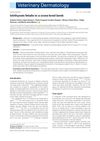 2 citations,
July 2019 in “Journal of The American Academy of Dermatology”
2 citations,
July 2019 in “Journal of The American Academy of Dermatology” The comment questions the study's methods for diagnosing hair loss, the type of injections used, the reliability of hair count as a measure, the lack of detail about the procedure, and disagrees with the conclusion about the effect of needling.
 2 citations,
January 2019 in “Case Reports in Dermatology”
2 citations,
January 2019 in “Case Reports in Dermatology” A 66-year-old woman's thick scalp and hair loss were confirmed as lipedematous alopecia, a rare condition possibly influenced by genetics, with no effective treatment known.
2 citations,
May 2018 in “European Journal of Dermatology” Lupus erythematosus panniculitis on the scalp can cause unique geometric hair loss patterns.
 2 citations,
July 2013 in “InTech eBooks”
2 citations,
July 2013 in “InTech eBooks” Scalp biopsy helps tell apart permanent and temporary hair loss types and guides treatment.
 2 citations,
March 2011 in “Dermatologica Sinica”
2 citations,
March 2011 in “Dermatologica Sinica” Taiwan reported its first case of a rare scalp condition with no clear cause or treatment.
 2 citations,
March 2004 in “Reviews in Gynaecological Practice”
2 citations,
March 2004 in “Reviews in Gynaecological Practice” Hormonal changes and psychological issues can cause sexual dysfunction in postmenopausal women. Behavioral therapy is recommended first, with hormone replacement helping some symptoms but not libido. Testosterone can improve libido, but its effects on overall sexual function are unclear. Emotional and relationship issues should be addressed before using medication, and the benefits and risks of testosterone supplementation should be considered.
 1 citations,
July 2024 in “Skin Research and Technology”
1 citations,
July 2024 in “Skin Research and Technology” High-frequency ultrasound can effectively visualize and assess hair loss.
 1 citations,
July 2023 in “Cytotherapy”
1 citations,
July 2023 in “Cytotherapy” Magnetic nanovesicles from stem cells can improve hair growth by staying in the skin longer.
 1 citations,
May 2023 in “Biochemical and Biophysical Research Communications”
1 citations,
May 2023 in “Biochemical and Biophysical Research Communications” Blocking DKK1 with siRNA can improve hair growth.
1 citations,
December 2022 in “Pharmaceutics” Finasteride-loaded microemulsions can effectively enhance skin delivery for treating hair loss.
 1 citations,
July 2021 in “Journal of Skin and Sexually Transmitted Diseases”
1 citations,
July 2021 in “Journal of Skin and Sexually Transmitted Diseases” Lipedema is a painful fat disorder in women that's hard to treat, often worsens with hormonal changes, and requires symptom-focused therapies.
 1 citations,
June 2019 in “Current developments in nutrition”
1 citations,
June 2019 in “Current developments in nutrition” A patient with Ehlers-Danlos Syndrome improved after treatment for fat malabsorption and essential fatty acid deficiency.
 1 citations,
July 2018 in “Journal of dermatology & cosmetology”
1 citations,
July 2018 in “Journal of dermatology & cosmetology” Hyaluronic acid successfully treated skin atrophy caused by corticosteroid injections.
 1 citations,
July 2018 in “Elsevier eBooks”
1 citations,
July 2018 in “Elsevier eBooks” Alopecia Areata is an autoimmune hair loss condition, with various treatments showing mixed effectiveness and no guaranteed cure.
 1 citations,
June 2017 in “Veterinary dermatology”
1 citations,
June 2017 in “Veterinary dermatology” A cross-bred lamb with severe skin and movement issues had ichthyosis fetalis but normal vitamin A levels.
 1 citations,
January 2014 in “Hair transplant forum international”
1 citations,
January 2014 in “Hair transplant forum international” Heavy smoking and other factors may lead to reduced blood flow and tissue death after hair transplant surgery.
 1 citations,
August 2012 in “Journal of acupuncture and meridian studies”
1 citations,
August 2012 in “Journal of acupuncture and meridian studies” Traditional Korean medicine combined with modern technology may improve hair removal treatments.
1 citations,
March 2006 in “The FASEB journal” Keratin-based scaffolds are safe and effective for tissue engineering.
 April 2023 in “Authorea (Authorea)”
April 2023 in “Authorea (Authorea)” A young woman with a rare skin cancer was diagnosed late because her symptoms were unusual for the disease.
Whale oil significantly promotes hair growth and may be a safe, effective alternative to minoxidil.
 May 2024 in “Dermatologic surgery”
May 2024 in “Dermatologic surgery” Nonactivated low leukocyte PRP injections can significantly increase hair and follicle density in women with alopecia.

Whale oil may safely and effectively promote hair growth.
 April 2024 in “Applied biological chemistry”
April 2024 in “Applied biological chemistry” Piperine from black pepper can make hair less oily by blocking fat cell development in hair roots.
 March 2024 in “Journal of pharmacopuncture”
March 2024 in “Journal of pharmacopuncture” Hominis Placenta Pharmacopunture helped regrow hair in a patient with stress-induced hair loss.
 February 2024 in “World journal of clinical cases”
February 2024 in “World journal of clinical cases” A young woman had surgery to remove a large hairball that blocked her intestines and then got psychiatric help.
 January 2024 in “International Journal of Dermatology Venereology and Leprosy Sciences”
January 2024 in “International Journal of Dermatology Venereology and Leprosy Sciences” Patients with acne vulgaris have lower serum irisin levels.

New imaging tools help doctors better examine hair and scalp health without surgery.
 June 2023 in “Skin Research and Technology”
June 2023 in “Skin Research and Technology” High-resolution MRI can distinguish between tertiary androgenetic alopecia and severe alopecia areata by measuring scalp and tissue thickness and hair follicle depth.
Lactobacillus and fermented Korean berry can help hair grow faster.

A woman regrew her hair after receiving injections of special cell-derived vesicles.
























